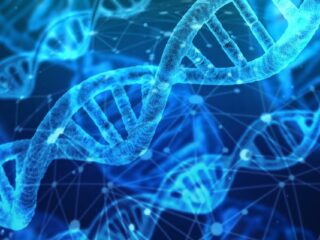The researchers already suspected that fertility had something to do with genetics, explains gynecologist Prof. Joop Laven of Erasmus MC. However, it came as a surprise that the genes for DNA repair and maintenance were particularly important. He says: ‘I thought we’ll probably find genes that influence the maturation of the egg cells. But nothing could be further from the truth.’
Menopause
The scientists examined the genetic material of over 200,000 women, whose age at menopause was known. They found 290 genetic variants that influence the age at which the menopause begins. Laven: ‘Because the menopause is preceded by a period of infertility and reduced fertility, we therefore also found genes associated with fertility.’ Many of the genes found, are involved in the maintenance and repair of DNA, in both sex cells and normal body cells.
To validate their findings, the researchers tested the 290 variants in another population of nearly 300,000 women. Similar effects on menopausal age by the variants were found. Laven and about six colleagues from Erasmus MC (all members of a large international consortium) published their findings in the leading scientific journal Nature.
DNA damage
The better DNA repair and maintenance works, the longer the fertile period. Here’s how that works: a woman is born with a limited supply of eggs. Over the years, those eggs suffer damage from smoking, obesity, other bad living habits and from exposure to all kinds of substances and radiation that cause DNA damage. This also explains the correlation that older mothers are more susceptible to increased risks of delivering children with birth defects. Their oocytes have suffered damage that is too great to be repaired properly due to aging. If the DNA damage can be fixed, more ‘properly repaired’ oocytes remain and the fertile period is therefore longer.
The new conclusions are in line with earlier findings among the Sami, the indigenous inhabitants of Lapland. Sami women do not use contraception, so are an ideal group to study natural aging and its connection to fertility. It turned out Sami women who had children later in life – between the ages of 40 and 45 – were more likely to live past 90. According to Laven, ‘apparently the aging of your body helps determine the length of the fertile period’. ‘This invalidates the old adage that aging begins post menopause. Rather, menopause is the result of aging and aging precedes menopause. Laven states that the onset of menopause is, so to speak, a telltale sign of how well DNA is being repaired and maintained’.
PCOS
It was already known that women with polycystic ovarian syndrome, or PCOS, remain fertile for a longer period than women without PCOS. This, too, appears to be related to DNA repair, according to other research in which Laven’s research group participated. Women with PCOS have more of the better variants of the genes that take care of DNA repair and maintenance. When the researchers looked at their embryos obtained through IVF, embryos from women with PCOS turned out to be much healthier and have less DNA damage than embryos from women similar of age without PCOS. Laven: ‘This completely explained why women with PCOS can often still have children after the age of 40 while for women without PCOS it seems almost impossible.’
For women who enter menopause early – roughly before the age of 40 – the exact opposite is true than for women with PCOS. Women with primary ovarian insufficiency (POI), as early menopause is called, have many of the genetic variants that indicate less proper DNA repair. This not only shortens fertility, but also increases the risk of other aging-related diseases such as alzheimer’s, diabetes and cardiovascular disease.
Laven has some advice for women whose mothers entered the menopause early. ‘We don’t have a drug yet to improve DNA repair. But we do know that healthy eating has a beneficial effect on aging in a general sense. In the future, we could even use the genes we’ve found now to give women advice on healthier aging.’



